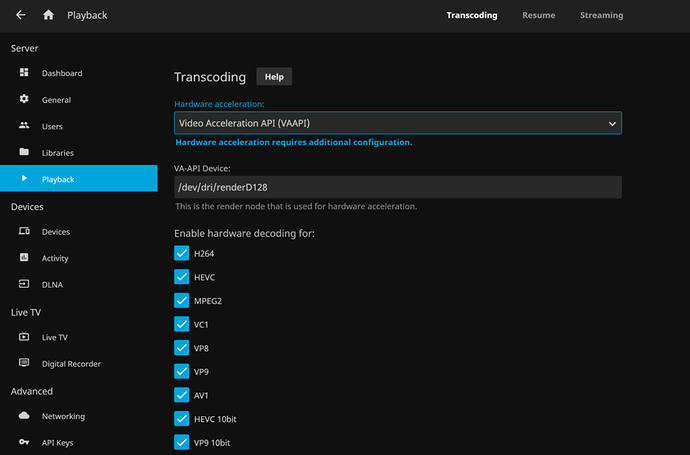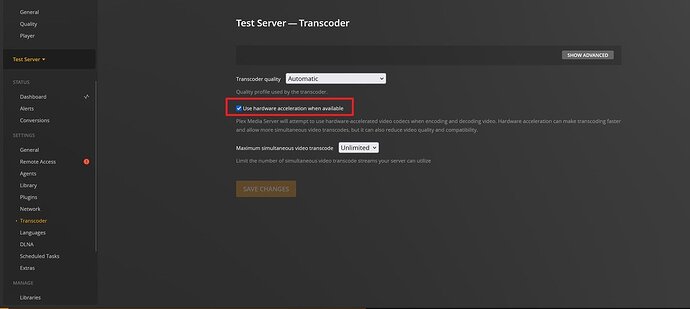EDIT: Here I am referring to QSV which is a codec supported by ffmpeg, you can see more information here: https://trac.ffmpeg.org/wiki/Hardware/QuickSync
I’m currently using ArchLinux. In the case of correctly configuring the graphics card driver, the graphics card of Intel 11th and 12th CPU can already use the QSV encoding function normally.
Emby, Jellyfin both support this feature, so why not consider supporting it? ![]()
As this article says: FFmpeg and oneVPL-intel-gpu (or quicksync) / Newbie Corner / Arch Linux Forums
In the latest version of FFmepg, it can support QSV encoding by turning on the flag; at the same time, we also know that Linux 6.1 does not yet support the QSV encoder of Intel graphics cards such as A380-this may require us to wait for a while.
P.S I also tested it under Fedora, it doesn’t even need to manually install the driver, it works out of the box - QSV decoder.‘
ffmepg version info:
ffmpeg version 5.1.2 Copyright (c) 2000-2022 the FFmpeg developers
built with gcc 12.2.1 (GCC) 20230111
configuration: --prefix=/usr --extra-cflags=-I/opt/cuda/include --extra-ldflags=-L/opt/cuda/lib64 --enable-lto --disable-rpath --enable-gpl --enable-version3 --enable-nonfree --enable-shared --disable-static --disable-stripping --enable-gray --enable-alsa --enable-avisynth --enable-bzlib --enable-chromaprint --enable-frei0r --enable-gcrypt --enable-gmp --enable-gnutls --enable-iconv --enable-ladspa --enable-lcms2 --enable-libaom --enable-libaribb24 --enable-libass --enable-libbluray --enable-libbs2b --enable-libcaca --enable-libcelt --enable-libcdio --enable-libcodec2 --enable-libdav1d --enable-libdavs2 --enable-libdc1394 --enable-libfdk-aac --disable-libflite --enable-fontconfig --enable-libfreetype --enable-libfribidi --enable-libglslang --enable-libgme --enable-libgsm --enable-libiec61883 --enable-libilbc --enable-libjack --enable-libjxl --enable-libklvanc --enable-libkvazaar --enable-liblensfun --enable-libmodplug --enable-libmp3lame --enable-libopencore-amrnb --enable-libopencore-amrwb --disable-libopencv --enable-libopenh264 --enable-libopenjpeg --enable-libopenmpt --disable-libopenvino --enable-libopus --enable-libplacebo --enable-libpulse --enable-librabbitmq --enable-librav1e --enable-librist --enable-librsvg --enable-librubberband --enable-librtmp --enable-libshine --enable-libsmbclient --enable-libsnappy --enable-libsoxr --enable-libspeex --enable-libsrt --enable-libssh --enable-libsvtav1 --enable-libsvthevc --enable-libsvtvp9 --disable-libtensorflow --enable-libtesseract --enable-libtheora --disable-libtls --enable-libtwolame --enable-libuavs3d --enable-libv4l2 --enable-libvidstab --enable-libvmaf --enable-libvo-amrwbenc --enable-libvorbis --enable-libvpx --enable-libwebp --enable-libx264 --enable-libx265 --enable-libxavs --enable-libxavs2 --enable-libxcb --enable-libxcb-shm --enable-libxcb-xfixes --enable-libxcb-shape --enable-libxvid --enable-libxml2 --enable-libzimg --enable-libzmq --enable-libzvbi --enable-lv2 --enable-lzma --enable-decklink --disable-mbedtls --enable-libmysofa --enable-openal --enable-opencl --enable-opengl --disable-openssl --enable-pocketsphinx --enable-sndio --enable-sdl2 --enable-vapoursynth --enable-vulkan --enable-xlib --enable-zlib --enable-amf --enable-cuda-nvcc --enable-cuda-llvm --enable-cuvid --enable-ffnvcodec --enable-libdrm --enable-libmfx --enable-libnpp --enable-nvdec --enable-nvenc --enable-omx --enable-rkmpp --enable-v4l2-m2m --enable-vaapi --enable-vdpau
libavutil 57. 28.100 / 57. 28.100
libavcodec 59. 37.100 / 59. 37.100
libavformat 59. 27.100 / 59. 27.100
libavdevice 59. 7.100 / 59. 7.100
libavfilter 8. 44.100 / 8. 44.100
libswscale 6. 7.100 / 6. 7.100
libswresample 4. 7.100 / 4. 7.100
libpostproc 56. 6.100 / 56. 6.100
It can decode video via QSV:
ffmpeg -hwaccel qsv -c:v h264_qsv -i input.mp4 -vf hwdownload,format=nv12 -pix_fmt yuv420p output.yuv




















